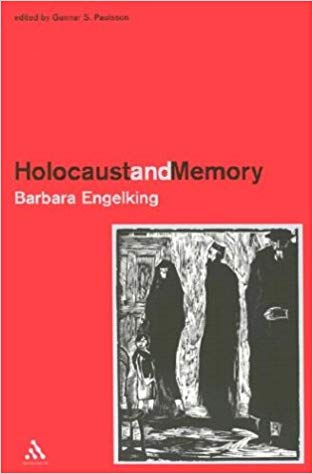Betrayals Jewish and Polish Motives Engelking

Holocaust and Memory, by Barbara Engelking. 2001
Jewish as Well as Polish Denouncers: Various Motives
This 2001 book harkens back to a time before author Barbara Engelking had taken a hard turn to the neo-Stalinism of the likes of Jan T. Gross and Jan Grabowski.
A CATEGORIZATION OF JEWISH AS WELL AS POLISH BETRAYERS OF FUGITIVE JEWS
The one strength of this book is its treatment of Polish szmalcowniki (extortionists of Jews). Unlike those who try to deny the marginal background of szmalcowniki, Engelking does not. In fact, she (pp. 51-52) divides the szmalcowniki into six types: 1). Poles indeed from socially disadvantaged or criminal backgrounds, 2). Poles of low character who normally would not commit crimes, but would do so on an opportunistic basis, 3). Poles who agreed with the Nazis about the need to destroy the Jews, 4). Poles fearful of the German-imposed death penalty manifesting their fear by obedience to German directives, 5). Poles (and Jews) who had earlier fallen into German hands and who had been promised to be spared in exchange for cooperation/collaboration, and 6). Poles nursing a grudge against Polish neighbors, and now in a position to hurt them and acquire their property.
This was no Polish disease. Similar considerations applied to both Polish and Jewish informers! (p. 78).
DO NOT ASSUME THAT FUGITIVE JEWS THAT DID NOT SURVIVE THE WAR HAD BEEN DENOUNCED OR KILLED BY LOCALS
To her credit, Engelking does not overdo it regarding collaborationism. She acknowledges the fact that the Germans often found Jews without outside support, as by frequent searches of Polish properties–sometimes of as many as 10,000 households during one sweep. (p. 78).
LUDWIK HIRSZFELD SCORNED BY HIS FELLOW JEWS FOR POINTING OUT UNWELCOME TRUTHS ABOUT JEWISH RACISM
Engelking interviews Jerzy, a Holocaust survivor, about Ludwik Hirszfeld. (p. 198). Jerzy states that Hirszfeld was disliked by fellow Jews not because he was assimilated, identifying as a Pole, and a convert to Christianity, but for other reasons. Jerzy alleges that Hirszfeld had been speaking of Jews engaging in racist terms reminiscent of that of the Nazis. Jerzy also alleges that Hirszfeld had earlier failed to protest such things as the quota system imposed by Poles against Jews at universities [the numerus clausus]. (However, Hirszfeld did condemn it in some of his writings, though he softened his criticism by pointing out that the Poles had done it while the Jews had power, and had turned to sympathy towards Jews after the latter had been deprived of all power by the Nazis. See my review of Hirszfeld’s HISTORY OF ONE LIFE).
THE STANDARD JUDEOCENTRIC NARRATIVE
Although it includes some novel information, this book repeats most of the same themes found in literature of this sort. There is the customary stress on differences between the persecutions of Jews and Poles, thus reinforcing the standard Holocaust supremacist victimhood hierarchy. Emphasis is placed on interviews with Jews. No attempt, however, is made to account for the fact that Holocaust survivors often graft what they heard from others, but did not actually experience themselves, into their personal memories.
Engelking’s emphasis on the distinctness of the Jewish experience leads her to make inane and incorrect generalizations. For instance, she stresses the premise that the Jewish experience was triadic (Germans as well as Poles as enemies), while that of the Poles was dyadic (Germans as the enemies). In actuality, the Poles faced TWO main enemies–the Nazi Germans (1939-1945) and the Soviet Communists (1939-1941 and 1944-on). In addition, Poles ALSO had to contend with collaborationists of various nationalities–working for either or both main enemies.
POLISH ANTISEMITISM (WHAT ELSE?)
Barbara Engelking cites Ludwik Landau (p. 35), who recognized the fact that the wartime anti-Semitism among Poles was not natural. The Germans had imposed it and fanned it as part of their strategy of dividing Poles and Jews. However, he criticizes Poles for being “too easily drawn” into such thinking, and for the prewar Polish authorities not having done enough to resist such thinking. However, Poles can make exactly the same complaint about Jews and Jewish-Soviet collaboration against Poles.
To see a series of truncated reviews in a Category click on that Category:
- All reviews
- Anti-Christian Tendencies
- Anti-Polish Trends
- Censorship on Poles and Jews
- Communization of Poland
- Cultural Marxism
- German Guilt Dilution
- Holocaust Industry
- Interwar Polish-Jewish Relations
- Jewish Collaboration
- Jewish Economic Dominance
- Jews Antagonize Poland
- Jews Not Faultless
- Jews' Holocaust Dominates
- Jews' Holocaust Non-Special
- Nazi Crimes and Communist Crimes Were Equal
- Opinion-Forming Anti-Polonism
- Pogrom Mongering
- Poland in World War II
- Polish Jew-Rescue Ingratitude
- Polish Nationalism
- Polish Non-Complicity
- Polish-Ukrainian Relations
- Polokaust
- Premodern Poland
- Recent Polish-Jewish Relations
- The Decadent West
- The Jew as Other
- Understanding Nazi Germany
- Why Jews a "Problem"
- Zydokomuna